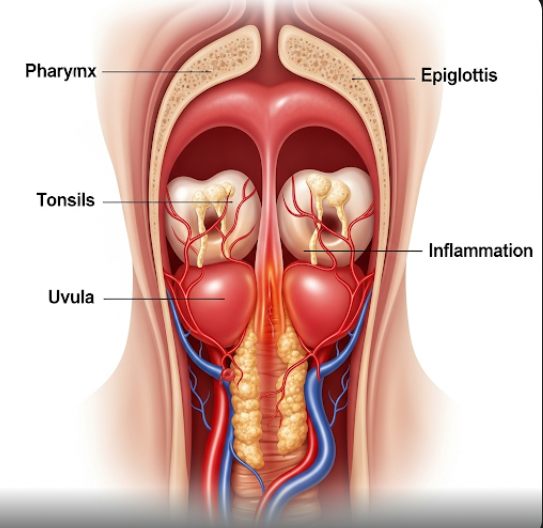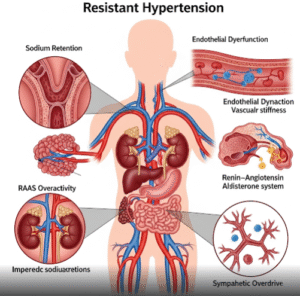Overview
Pharyngitis is the medical term for inflammation of the pharynx, the part of the throat located behind the nose and mouth. It is one of the most common causes of a sore throat and can be either viral or bacterial in origin. While most cases are mild and resolve on their own, some may require medical treatment, particularly when caused by Streptococcus bacteria. Pharyngitis affects people of all ages and is most frequent during colder months.
What is Pharyngitis?
Pharyngitis is an infection or irritation of the pharyngeal mucosa, leading to symptoms such as throat pain, difficulty swallowing, and scratchiness. It can be acute (short-term) or chronic (long-term). Most cases are caused by viruses, such as the common cold or flu, but bacterial infections—especially Group A Streptococcus (GAS)—can also be responsible.
Pharyngitis is often part of a broader upper respiratory tract infection but can also occur independently. Diagnosis typically involves physical examination and, in some cases, throat swabs or lab tests.
Symptoms
The symptoms of pharyngitis can range from mild to severe and may include:
- Sore throat or scratchy throat
- Pain or difficulty when swallowing
- Redness and swelling of the throat
- Swollen lymph nodes in the neck
- Fever (more common in bacterial cases)
- Headache or body aches
- Cough, runny nose, and nasal congestion (more common in viral cases)
- White patches or pus on the tonsils (especially in bacterial infections)
- Fatigue or malaise
In children, symptoms may also include nausea, vomiting, or abdominal pain.
Causes
Pharyngitis is caused by a variety of infectious and non-infectious agents:
Viral Causes (most common):
- Rhinovirus
- Influenza virus
- Coronavirus
- Epstein-Barr virus (mononucleosis)
- Adenovirus
Bacterial Causes:
- Group A Streptococcus (Streptococcus pyogenes)
- Mycoplasma pneumoniae
- Chlamydia pneumoniae
- Neisseria gonorrhoeae (rare, sexually transmitted)
Non-Infectious Causes:
- Allergies (e.g., pollen, dust)
- Dry air or pollution
- Smoking or secondhand smoke
- Acid reflux (GERD)
- Overuse of the voice (shouting or prolonged speaking)
Risk Factors
Several factors can increase the likelihood of developing pharyngitis:
- Close contact with someone who is infected
- School or daycare attendance (especially in children)
- Seasonal changes (more common in fall and winter)
- Poor air quality or environmental irritants
- Smoking or frequent alcohol use
- Weakened immune system
Complications
Most cases of pharyngitis resolve without complications, but untreated bacterial infections can lead to more serious problems:
- Tonsillitis or peritonsillar abscess
- Otitis media (middle ear infection)
- Sinusitis
- Scarlet fever (from Group A Strep)
- Rheumatic fever (can affect the heart, joints, and brain)
- Post-streptococcal glomerulonephritis (a kidney disorder)
Early diagnosis and appropriate treatment help reduce the risk of complications.
Prevention
Pharyngitis can often be prevented through good hygiene and lifestyle practices:
- Wash hands frequently with soap and water
- Avoid close contact with infected individuals
- Do not share utensils, cups, or personal items
- Use tissues when coughing or sneezing and dispose of them properly
- Stay hydrated and maintain good nutrition
- Avoid smoking and exposure to secondhand smoke
- Use a humidifier in dry indoor environments
- Stay up to date on flu and other relevant vaccinations
Treatment Options in Korea
South Korea offers high-quality care for pharyngitis through its national healthcare system, which combines modern diagnostics and treatment with fast accessibility:
Diagnosis and Testing:
- Physical examination by a general practitioner or ENT specialist
- Rapid Antigen Detection Test (RADT): For detecting strep throat
- Throat culture: More accurate but takes longer
- Blood tests if mononucleosis or other viral causes are suspected
Treatment Approaches:
For Viral Pharyngitis (most common):
- Symptomatic care (rest, hydration, throat lozenges)
- Over-the-counter pain relievers (e.g., acetaminophen, ibuprofen)
- Saltwater gargles and warm fluids
- Antiviral medications (rarely needed)
For Bacterial Pharyngitis (e.g., strep throat):
- Antibiotics such as penicillin, amoxicillin, or cephalosporins
- Full completion of the antibiotic course is essential to prevent complications
- Follow-up visits if symptoms persist or worsen
Advanced Care in Korea:
- Leading hospitals like Seoul National University Hospital, Asan Medical Center, and Samsung Medical Center provide expert ENT services, rapid diagnostics, and multilingual support.
- Pharmacies in Korea are well-regulated and offer easy access to prescribed medications.
- Telemedicine and online consultations are increasingly available for mild cases.













